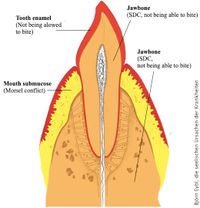Tooth body, jawbone
Self-devaluation conflicts (SDC) and separation conflicts are often related.
Although one is not in immediate mortal danger with a SDC, any problem that manifests itself physically or mentally is related to a survival issue. With a SDC, there is a fear that one will not be accepted by the group if one is not good enough. This is a separation issue and if one is "rejected," a life-threatening situation does arise, see ectoderm. Thus, because of the SDC, a separation conflict lurks in the background and one wants to avoid that.
Also see bones.
Whether it involves the left or right side of the body depends on the biological laterality of the person.
Theme
Biting conflict. Unable or afraid to bite (incisors), hold (canines) or grind (molars) because one is weaker than the opponent (not allowed to bite, see tooth enamel).
Also: I have many cavities, my teeth are not good!
CA phase
Degradation of cells in tooth body and/or underlying jawbone. Cavities are visible only on an X-ray.
Symptoms
Unnoticed.
Paradontosis: receding gums due to erosion of the underlying jawbone (tooth bed). Long teeth to enable better biting. With prolonged conflict activity: tooth may be loose and/or fall out.
PCL phase
Reconstruction of the teeth, molars and/or jawbone.
Symptoms
(Severe) pain, especially with a deep hole reaching to the marrow of the teeth, swelling, jaw swelling. Especially severe with the syndrome.
Paradontitis: reconstruction of the tooth bed, pain. Teeth may be temporarily loose due to healing swelling. After EC (expelling fluid) they reattach.
Dental plaque: the sweet, chalky fluid (callus) that provides tooth repair can flow freely through the mouth and stick to the teeth.
Tartar: hardened callus.
Biological purpose
The biological purpose is at the end of the PCL-B: stronger teeth, stronger dental bed.
EC
Unnoticed, cold days

